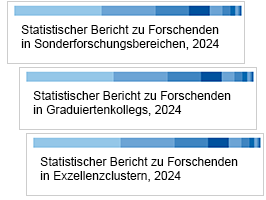Statistical Reports on Researchers in Collaborative Research Centres, Research Training Groups and Clusters of Excellence
Selected findings from the annual survey in Coordinated Programmes

The DFG conducts annual surveys in the context of the Coordinated Programmes to collect data about the scientists who participate in research at the Collaborative Research Centres, Research Training Groups and Clusters of Excellence that it funds.
Based on this data, the present reports focus on three thematic areas: the distribution by gender, the place of employment before joining the team and the funding of the participating researchers.
The results are considered in a differentiated manner in each case:
The considered time span depicts developments in the last five years and thus includes the years of the coronavirus pandemic. The development over time provides an overview of which structures remain stable over time and which are undergoing change. There are many comparable trends despite all the differences among funding programmes and career stages of the researchers. The number of researchers who were working abroad before joining the team is rising continuously. This is particularly evident in Clusters of Excellence.
Differentiation according to the four DFG research areas reveals discipline-specific special features in reporting year 2023. For example, participation of international postdoctoral researchers in the natural sciences is particularly high. Doctoral researchers are mainly financed through network funds; in the humanities and social sciences as well as in the engineering sciences, this is more pronounced than in the natural sciences.
For Collaborative Research Centres:
- Statistical Reports on Researchers in Collaborative Research Centres, 2024 [DOI: 10.5281/zenodo.11352294] (in German only(externer Link)
- Statistical Reports on Researchers in Collaborative Research Centres, 2022 [DOI: 10.5281/zenodo.6976217] (in German only(externer Link)
- Report: "Personnel Structures in Collaborative Research Centres 2020" (in German only) [DOI: 10.5281/zenodo.3973065(externer Link)
For Research Training Groups:
- Statistical Reports on Researchers in Research Training Groups, 2024 [DOI: 10.5281/zenodo.11353090] (in German only(externer Link)
- Statistical Reports on Researchers in Research Training Groups, 2022 [DOI: 10.5281/zenodo.6976448] (in German only(externer Link)
- Report: "Personnel Structures in Research Training Groups 2020" (in German only) [DOI: 10.5281/zenodo.3972901(externer Link)